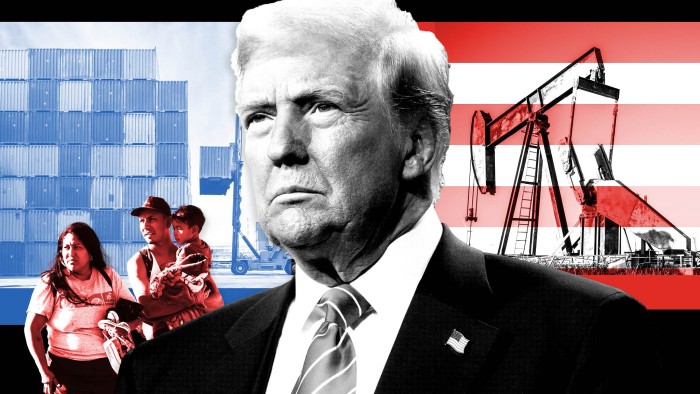Donald Trump and his top advisers are finalizing about 100 executive actions he will sign in his first days in office starting Monday as the president-elect rushes to implement his populist and nationalist agenda.
The first measures by Trump, who has vowed to be a dictator “on day one” of his second term, will include curbing immigration, raising tariffs and deregulation of sectors ranging from energy to cryptocurrencies.
“I will act with historic speed and strength and fix every crisis facing our country,” Trump told a rally of supporters in Washington on Sunday.
Trump and his team aim to immediately reset American politics and begin to deliver on some of the sweeping promises of change he made to American voters during the campaign, when he pledged to reverse many of Joe Biden’s actions.
“Their goal is to shock and awe so that their opponents’ heads spin,” said Stephen Myrow, managing partner at Beacon Policy Advisors, a consultancy and a former George W Bush administration official.
“They’ve spent the last four years, day in and day out, preparing for Monday, and they’ve had teams of lawyers thinking about how they can achieve what they want to achieve.”
Trump’s first steps will serve as a test of how much he believes he can act unilaterally without Congress, given his view that US presidents should have far-reaching authority over other branches of government.
Details of the first move of executive action were still under wraps at the weekend, but Trump and his top officials have already signaled what their priorities will be. The incoming president wants to declare a national emergency on the southern border, free up federal resources to stop migrants crossing from Mexico, limit the ability to seek asylum and launch what he has described as the most ambitious effort yet. largest deportation in US history.
Addressing a rally at Washington’s Capital One Arena on Sunday, Trump said: “Tomorrow at noon, the curtain closes on four long years of American decline and we begin a brand new day of American strength and prosperity, American dignity and pride.” .
Trump is also expected to take swift action on America’s trade policies. The president-elect wants to force trading partners to cut deals on issues ranging from migration to drug trafficking and even the sale of Greenland. He also pledged to impose heavy taxes on imports to encourage companies to produce more in the US and raise revenue for the government.
In recent weeks, Trump advisers have considered options that include a gradual introduction of tariffs hitting specific critical sectors and industries related to energy and defense, according to people familiar with the discussions. But others, including his former White House trade and manufacturing adviser, Peter Navarro, are advocating a hefty tariff that would apply to all US imports from day one.
Trump could use the International Emergency Economic Powers Act to quickly apply the tariffs, and his staff is also considering using existing Section 232 authorities to quickly raise tariffs on steel and aluminum imports, according to people familiar with the talks.
Republicans on Capitol Hill, who have also traditionally opposed tariffs, are already tentatively defending Trump’s opening moves.
“I think what you’re going to see is more countries coming to the table,” said one Republican member of Congress. “And I think it will be more effective than you think without raising prices.”
On foreign policy, Trump’s main concern on the first day of his second term will likely be implementing the cease-fire agreement reached between Israel and Hamas to end the war in Gaza last week.
But analysts said there could be executive orders and efforts to impose new sanctions on Iran and toughen enforcement of those already on the books, as part of his aim to put “maximum pressure” on the Tehran regime.
Trump’s team is also figuring out how to deal with the transitional government in Syria, led by a former al-Qaeda affiliate, Hayat Tahrir al-Sham. Some US allies would like to see Washington lift the terrorism designation in Syria as well as the group, but Trump’s team is concerned about doing so too soon.
During the campaign, Trump had pledged to end the fighting between Russia and Ukraine on his first day in office. But recently he has said he hopes to resolve it in the first six months. In the short term, Trump will have funds from last year’s Congress to continue supplying Ukraine with weapons, but he is unlikely to pass another package after they have been used.
Trump has also said he plans to speak with Vladimir Putin soon, while the Russian president has expressed interest in meeting him. Other world leaders are expected to begin flocking to Washington to try to get new relations on the right track.
Trump is expected to make early moves to help the US oil and gas industry as part of his pledge to usher in a new era of US “energy dominance”. Among his first day’s executive orders, he has pledged to direct the federal government to cut red tape and “end all of Biden’s restrictions on energy production.”
He is also set to order the immediate resumption of licenses for multi-billion dollar liquefied natural gas export terminals. Biden’s suspension of new permits a year ago has been a particular bone of contention for executives keen to boost LNG shipments.
The Biden administration’s rules that cracked down on vehicle emissions — described by Trump as a “crazy electric vehicle mandate” — are expected to be on the next president’s hit list. Also expected is a directive to reopen protected lands in Alaska to drilling.
“He’s going for maximum hit value,” Myrow said.


